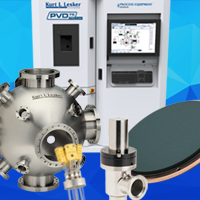Lesker U Live! is series of free webinars spanning many topics taught by leading vacuum experts.
Lesker U provides the following:
- High-value vacuum expert training
- A solid base of understanding surrounding vacuum technology
- Deep dives on specific vacuum technology topics
Introduction to Residual Gas Analysis: Characterizing Partial Pressures
The precise characterization of pressure in a vacuum system requires the analysis of the residual gases that are present. This special 1.5 hour introduction to Residual Gas Analysis (RGA) or partial pressure analysis will review the additional data than can be acquired as compared to a simple measure of total pressure. The system uses atomic mass units to distinguish atomic and molecular gases in addition to gas compounds such as CO2, fingerprints, pump fluids, and other hydrocarbons. In this webinar the broad range of useful information, including trends in gas composition, outgassing rate, leak detection, and system cleanliness derived from RGA will be discussed. Principles of operation, pressure limits, sensitivity, mass ranges, spectra interpretation, detector placement, start-up and shutdown will also be discussed.
Duration: 1 Hour(s)
Expert(s): J.R. Gaines
J.R. Gaines is the Technical Director of Education for the Kurt J. Lesker Company, (Jefferson Hills, PA). The Lesker Company is a global scientific equipment manufacturer supplying materials and tools for vacuum-enabled innovation. Gaines has more than 40 years of experience in the research, development and commercialization of advanced materials technologies including superconductivity, semiconductors, cryogenics, space simulation, energy generation, energy conversion and storage. His experience includes vacuum systems, thin film deposition, inorganic chemistry, nanotechnology, and advanced ceramic processing.
Date:
REGISTERCleaning Components for High and Ultra-High Vacuum Service
Despite nearly 2,500 years of progress in vacuum science, much of the practice of cleaning components for vacuum service remains shrouded in folklore. Further, many of the materials used by pioneers in this area are now banned for environmental and health reasons. In this brief webinar, basic procedures to clean components for high and ultra-high vacuum use will be discussed including the preparation of a facility in which to do cleaning, personal protective equipment, green or sustainable materials for cleaning, and tests to verify the efficacy of a cleaning process. Materials to be cleaned will include metals such as 300 series stainless steel, aluminum, and copper, as well as glass and some ceramics. Approaches to mitigate the contamination of components and vacuum chambers will also be reviewed.
Duration: 1 Hour(s)
Expert(s): J.R. Gaines
J.R. Gaines is the Technical Director of Education for the Kurt J. Lesker Company, (Jefferson Hills, PA). The Lesker Company is a global scientific equipment manufacturer supplying materials and tools for vacuum-enabled innovation. Gaines has more than 40 years of experience in the research, development and commercialization of advanced materials technologies including superconductivity, semiconductors, cryogenics, space simulation, energy generation, energy conversion and storage. His experience includes vacuum systems, thin film deposition, inorganic chemistry, nanotechnology, and advanced ceramic processing.
Date:
REGISTERDetecting Leaks in Vacuum Systems
Leaks are the bane of vacuum systems. Leaks are one of the principal causes that inhibit the achievement of optimal base pressures. There are several approaches available to detect leaks of various sizes which do not involve expensive leak detection tools. In this course the methods to quantify leaks and a general approach to detection will be presented. In addition, specific techniques to detect leaks in rough, medium, high and ultra-high vacuum will be detailed. The use of helium-based leak detectors as well as the use of residual gas analysis for finding very small leaks will also be highlighted.
Duration: 1 Hour(s)
Expert(s): J.R. Gaines
J.R. Gaines is the Technical Director of Education for the Kurt J. Lesker Company, (Jefferson Hills, PA). The Lesker Company is a global scientific equipment manufacturer supplying materials and tools for vacuum-enabled innovation. Gaines has more than 40 years of experience in the research, development and commercialization of advanced materials technologies including superconductivity, semiconductors, cryogenics, space simulation, energy generation, energy conversion and storage. His experience includes vacuum systems, thin film deposition, inorganic chemistry, nanotechnology, and advanced ceramic processing.
Date:
REGISTERIntroduction to Residual Gas Analysis: Characterizing Partial Pressures
The precise characterization of pressure in a vacuum system requires the analysis of the residual gases that are present. This special 1.5 hour introduction to Residual Gas Analysis (RGA) or partial pressure analysis will review the additional data than can be acquired as compared to a simple measure of total pressure. The system uses atomic mass units to distinguish atomic and molecular gases in addition to gas compounds such as CO2, fingerprints, pump fluids, and other hydrocarbons. In this webinar the broad range of useful information, including trends in gas composition, outgassing rate, leak detection, and system cleanliness derived from RGA will be discussed. Principles of operation, pressure limits, sensitivity, mass ranges, spectra interpretation, detector placement, start-up and shutdown will also be discussed.
Duration: 1 Hour(s)
Expert(s): J.R. Gaines
J.R. Gaines is the Technical Director of Education for the Kurt J. Lesker Company, (Jefferson Hills, PA). The Lesker Company is a global scientific equipment manufacturer supplying materials and tools for vacuum-enabled innovation. Gaines has more than 40 years of experience in the research, development and commercialization of advanced materials technologies including superconductivity, semiconductors, cryogenics, space simulation, energy generation, energy conversion and storage. His experience includes vacuum systems, thin film deposition, inorganic chemistry, nanotechnology, and advanced ceramic processing.
Date:
REGISTER


